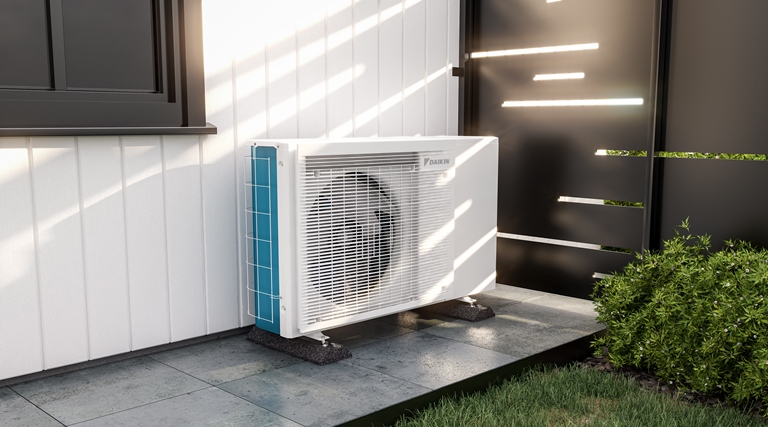
Addressing the environmental impact of our homes and buildings will drive significant changes for homeowners and heating businesses. Iain Bevan, Commercial Manager – Renewable Heating at Daikin, outlines why 2023 is the year to expand and include air source heat pump installation.
The abnormally dry summer and record-breaking temperatures experienced by the UK last year made it clear that the climate crisis must be urgently addressed. The Government has set a legally binding target for the UK to achieve net zero by 2050 but there is a long way to go before we get there. In the UK, around 30% of the total greenhouse gas emissions come from buildings, and heating accounts for more than three-quarters (79%) of this, which alone represents 23% of all UK emissions.
Looking ahead to 2025
Given the emissions currently generated, the focus of the next few years will undoubtedly be the decarbonisation of heating. There have already been updates to the Building Regulations, which came into force in June last year, with the aim of reducing emissions from new homes and other new buildings by as much as 30%. This will be followed by the Future Homes Standard in 2025, which, through further updates to the Building Regulations, will require homes built from 2025 to produce at least 75% fewer carbon emissions than one built in line with 2013 regulations.
In addition, the Government has announced that from 2025 new homes must include low carbon heating systems in place of gas boilers. While there is no confirmation on when gas boilers will be phased out more widely, it is likely to happen in the coming years as the use of natural gas and other fossil fuels is constrained.
As an established and proven low carbon technology, heat pumps have a clear role to play in decarbonisation. Air source heat pumps (ASHP) extract energy from the outside air via a refrigerant and use a compressor to raise the temperature of this refrigerant. The heat generated is then used to provide heating and hot water.
Using a heat pump can significantly reduce the amount of energy required to meet the needs of the property as they typically function at around 300% efficiency – 3kw of heat generated for every 1kw of electricity used – and operate in temperatures as low as -25°C. These efficiency figures compare favourably with the approximately 90% efficiency achieved by new condensing gas boilers.
What does this mean for heating installers now?
To achieve the transition to low carbon heating, the UK will require a large number of qualified heat pump engineers, meaning there are significant opportunities for those with the required knowledge and skills. There are more than 27 million existing homes that need to be retrofitted in the next 25 years as well as installations in the new build properties. However, the Department for Business, Energy and Industrial Strategy (BEIS) estimates that there are less than 4,000 qualified heat pump installers in the UK*, compared to more than 130,000 Gas Safe Registered engineers.
With the correct support, it is relatively straightforward for qualified and experienced heating professionals to gain the knowledge and qualifications needed to install, commission and maintain heat pumps. In fact, mono-bloc heat pumps do not require F-Gas certification to install or maintain as the refrigerant is sealed within the unit. This means only water pipe connections are required between the heat pump unit and the building’s heating system pipework.
While gas and oil boilers will not disappear overnight, they will be a progressively smaller part of the industry as renewable and low carbon alternatives, such as heat pumps, become more widespread. In addition, there are definite benefits to making the move into this area sooner rather than later. For example, there are currently initiatives in place to encourage homeowners to choose a heat pump as a replacement for their boiler.
Until 2025, the Government’s Boiler Upgrade Scheme will provide funding to reduce the cost of heat pump installations in England and Wales. It offers homeowners a grant of up to £5,000 towards the cost. Similarly, the Home Energy Scotland Loan allows homeowners in Scotland to borrow up to £10,000 to fund the installation of a heat pump, with up to 75% cashback. This means the total repayable by the homeowner will be less than £2,500 on an interest-free loan.
Taking the next step
For heating engineers interested in adding heat pumps to the range of services they offer to their customers, seeking training is the first step. One of the best places to start is by looking at what heat pump manufacturers can offer. For example, at Daikin, we offer free product training sessions for installers. These are focussed on heat pump technologies and cover the installation, commissioning and maintenance of heat pump systems. Available at our national network of training centres, installers can find a location that is convenient for them.
However, to take full advantage of the opportunities, installers may need to achieve Microgeneration Certification Scheme (MCS) accreditation through investment in further training and assessments. For example, new heat pump installations in England and Wales are only eligible for the Boiler Upgrade Scheme if carried out by an installer with MCS certification. Our Woking Training Centre offers the Logic LCL accredited heat pump qualification in the installation and maintenance of air source heat pump systems, which counts towards MCS certification.
With the ongoing drive for the adoption of low carbon heating solutions and the current incentives making it easier for homeowners, there has never been a better time for heating professionals to expand their skills and help futureproof their business. Partnering with manufacturers who can offer the required training and support can help make acquiring the necessary knowledge and skills simple and straightforward.
To find out more about the Daikin range of heat pumps as well as the training opportunities and installer support please click here.













